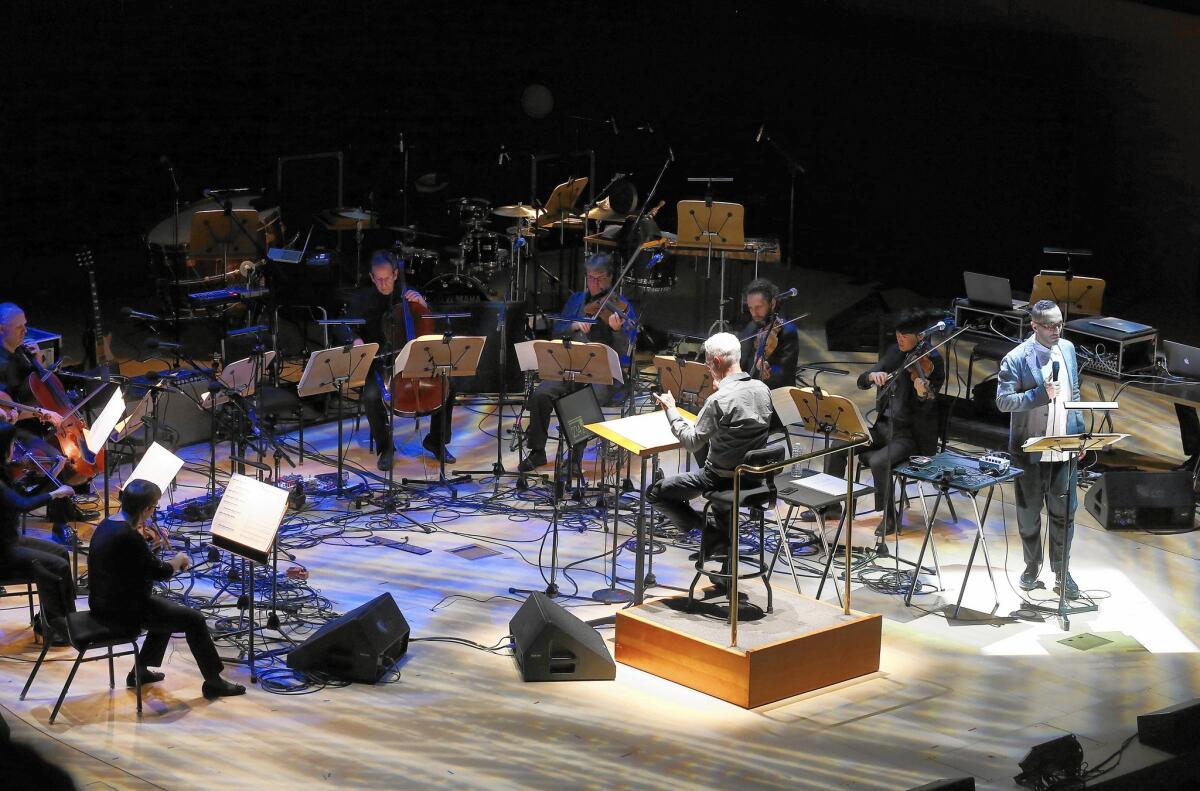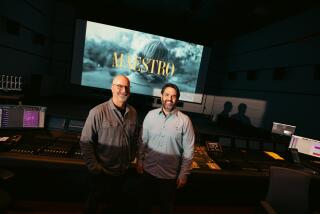Review: Beth Morrison’s ‘21C Liederabend. Op. LA’ at Disney Hall was a good idea (but next time, rethink the presentation, please)

All the world, iTunes tells us, is a song. But if one-size-fits-all digital platforms can’t distinguish among a symphony, a raga and “Eleanor Rigby,” the real world sometimes has the opposite problem.
Although song form lies at the heart of popular culture, art songs have become box-office horror. Singers still sing them and record them. Composers still write them. But the song recital is a barely viable thing, and institutions wonder what to do.
SongFest celebrates its 20th anniversary in June with a month-long training program and concerts at the Colburn School in hopes of inspiring young singers to protect and repopulate an endangered species.
Music theater producer Beth Morrison has a more radical approach. She has begun trying to restore a really dead ritual, the 19th century Liederabend. This was an evening gathering among musicians and intelligentsia devoted to singing and admiring art songs, along with a little carousing.
In 2009, she created the “21C Liederabend” with modern, edgy songs in hip New York venues. On Tuesday night, in collaboration with composers Paola Prestini and John Adams, Morrison made a Liederabend for the Los Angeles Philharmonic’s Green Umbrella series at Walt Disney Concert Hall. That meant new or newish songs by — with the exception of Adams — emerging composers. Adams adamantly conducted the orchestra’s new music group.
This being the 21st century, rock guitars and drums were included, and there was, for all the songs, video. Songs aren’t songs, YouTube tells us, sans video.
This also being the 21st century and a Beth Morrison Projects production, “21C Liederabend. Op. LA” was a good idea. But it was a mess, if an often worthwhile mess. The frustration came not from the music and not from the performers, but from the presentation.
The lineup spared little expense. I can’t imagine that a stage has before been shared by noted operatic baritone Nathan Gunn, three likely future opera stars — soprano Jessica Rivera, mezzo-soprano Peabody Southwell and bass-baritone Cedric Berry — along with the mesmerizingly unclassifiable Timur Bekbosunov, Theo Bleckmann and Craig Wedren.
The composers included names in new music news. David T. Little’s opera, “JFK,” will have its premiere in Fort Worth on Saturday. Ted Hearne’s opera, “The Source” (about Army Pvt. Chelsea Manning, who leaked classified material to WikiLeaks), will be presented by Los Angeles Opera next season. Paola Prestini’s opera, “Two Oars,” is being developed by Robert Wilson. If this sounds like music theater-heavy Liederabend, it was, especially when you add Adams’ three songs from his Broadway-style “I Was Looking at the Ceiling and Then I Saw the Sky.”
That, along with less theatrical songs by lesser-known but worth-knowing young composers, helped this Liederabend resemble a musical version of a smartly curated art exhibition where in a couple of hours you can get an idea of what matters in the art world.
So, the first question to ask is why did a full house (and with a significant number of fashionable, sophisticated-looking young people) begin to empty out at intermission? The answer was pretty easy to figure out. Nobody, this writer included, had much of a clue as to what was going on.
Each composer usefully introduced his or her work. An insert in the program included the essential lyrics, all the texts being new work. But that wasn’t enough.
Were the video simply unimaginative distraction, which it was, that might not have been an intractable problem. You could close your eyes. But singers are actors, and the video asked you not to look at them but at the screens (one large, three small). That meant tireless sequences of clichéd misty images of stars, desert sand, children sleeping, floating women and so on.
Amplification was used, and texts (which were not, with one exception, projected) remained mostly unintelligible. The essence of song performance, its humanity and intimacy (which the composers talked and wrote about), was devalued. What this evening did, however, adequately reveal was the degree to which the hipper young composers are interested in theater and pop. Much that was presented came from intriguing music theater works in progress.
Accompanied by his hard-rocking band, Dime Museum, Bekbosunov fabulously belted the two songs from Little’s “Artaud in the Black Lodge” (with texts by Beat poet Anne Waldman) that enigmatically delve into the twisted edges of William Burroughs’ psyche. Extended excerpts from Prestini’s “Hubble Cantata,” sung by Rivera, Gunn and the Los Robles Master Chorale, connect the life of humans with that of stars in luminously involving music, but this suffered most from forcing us to watch unimaginative star photography rather than follow the four pages of dramatic text.
In the briefer excerpts from another cantata sung by the chorus, Hearne’s politically charged “Sound From the Bench,” lack of intelligibility meant missing the message of a punchy yet lyrical reflection on the Supreme Court’s treatment of corporations as people. Here, big business, as people without mouths, is likened to sneaky ventriloquism.
Adams’ “Ceiling/Sky,” written in wake of the 1994 Northridge earthquake, chillingly presages the issues of the Black Lives Matter movement. In the numbers here, Gunn served as the abusive cop, Mike, and Berry as his deeply moving victim, Dewain. Adams conducted as if each urgent downbeat were a punch in the ribs. Two years ago, Long Beach Opera gave the neglected score a reading. Increasingly timely, it needs a persuasive new production, immediately.
There were hints of intimacy in Southwell’s seductive performances of a new song by Juhi Bansal, “Begin,” an intricate evocation of early computing machines, and Leaha Maria Villarreal’s mysteriously elliptical, Beckett-like “Never Not.” Bleckmann was the dreamy soloist in the premiere of Jacob Cooper’s moody “Ripple in the Sky.”
Wedren ended it all with plain weirdness. A rocker dressed in a robe and barefoot, he sang two songs by Jefferson Friedman as if in a mystical, robotic trance. There was, finally, no video, and he held the crowd spellbound.
More to Read
The biggest entertainment stories
Get our big stories about Hollywood, film, television, music, arts, culture and more right in your inbox as soon as they publish.
You may occasionally receive promotional content from the Los Angeles Times.







